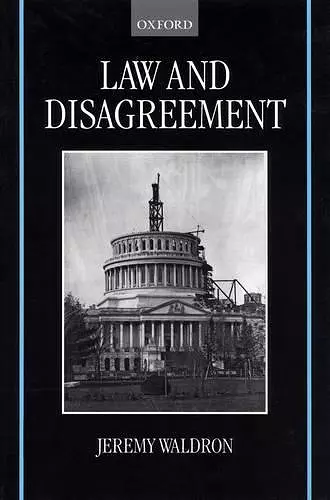Law and Disagreement
Format:Hardback
Publisher:Oxford University Press
Published:11th Mar '99
Currently unavailable, and unfortunately no date known when it will be back
This hardback is available in another edition too:
- Paperback£57.00(9780199243037)

When people disagree about justice and about individual rights, how should political decisions be made among them? How should they decide about issues like tax policy, welfare provision, criminal procedure, discrimination law, hate speech, pornography, political dissent and the limits of religious toleration? The most familiar answer is that these decisions should be made democratically, by majority voting among the people or their representatives. Often, however, this answer is qualified by adding providing that the majority decision does not violate individual rights. In this book Jeremy Waldron has revisited and thoroughly revised thirteen of his most recent essays. He argues that the familiar answer is correct, but that the qualification about individual rights is incoherent. If rights are the very things we disagree about, then we are quarrelling precisely about what that qualification should amount to. At best, what it means is that disagreements about rights should be resolved by some other procedure, for example, by majority voting, not among the people or their representatives, but among judges in a court. This proposal although initially attractive seems much less agreeable when we consider that the judges too disagree about rights, and they disagree about them along exactly the same lines as the citizens. This book offers a comprehensive critique of the idea of the judicial review of legislation. The author argues that a belief in rights is not the same as a commitment to a Bill of Rights. He shows the flaws and difficulties in many common defences of the democratic character of judicial review. And he argues for an alternative approach to the problem of disagreement: when disagreements about rights arise, the respectful way to resolve them is by decision-making among the right-holders on a basis that reflects an equal respect for them as the holders of views about rights. This respect for ordinary right-holders, he argues, has been sadly lacking in the theories of justice, rights, and constitutionalism put forward in recent years by philosophers such as John Rawls and Donald Dworkin. But the book is not only about judicial review. The first tranche of essays is devoted to a theory of legislation, a theory which highlights the size, the scale and the diversity of modern legislative assemblies. Although legislation is often denigrated...
... shrewd observations about the place of majority voting. * The Philosophical Review, Oct 2002 *
Waldron is making an influential contribution to legal philosophy ... Walsron is an eloquent advocate for democratic processes and the protection of autonomy. * Robert John Araujo, S. J., International Philosophical Quarterly December 2000 *
ISBN: 9780198262138
Dimensions: 243mm x 164mm x 24mm
Weight: 628g
344 pages